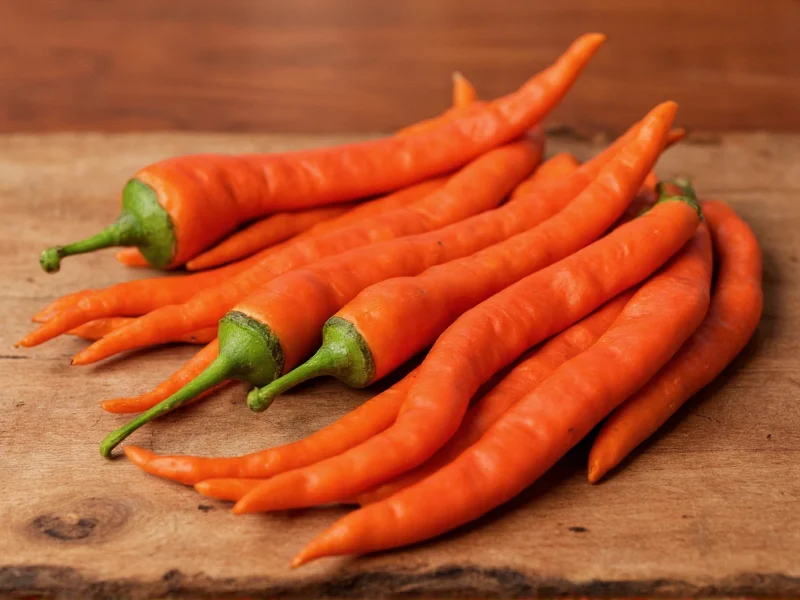The best fresno chile substitute is jalapeño peppers for similar flavor with slightly less heat, or serrano peppers for increased spiciness. For dried alternatives, guajillo peppers offer comparable heat levels while chipotle peppers in adobo provide smoky depth. When substituting, use a 1:1 ratio for fresh peppers but adjust to taste based on your heat tolerance.
When your recipe calls for Fresno chiles but you're staring at an empty produce section, knowing the right substitution can make or break your dish. These vibrant red or green chilies bring a distinctive medium heat (2,500-10,000 Scoville units) with bright, slightly sweet notes that enhance salsas, sauces, and roasted dishes. Understanding what makes Fresno chiles unique helps you select the perfect replacement without compromising your culinary creation.
What Makes Fresno Chiles Special
Fresno chiles occupy that sweet spot between mild and hot, offering more complexity than jalapeños but less fire than serranos. Their thick walls make them ideal for stuffing, pickling, or roasting. When mature, they turn from green to brilliant red, developing sweeter, fruitier notes. This versatility explains why they've become pantry staples for home cooks and professional chefs alike seeking that perfect balance of heat and flavor.
Top Fresh Fresno Chile Substitutes
When substituting fresh chilies, consider both heat level and flavor profile. The following options work well depending on your recipe's requirements and personal spice tolerance:
| Substitute | Heat Level (SHU) | Flavor Profile | Best For |
|---|---|---|---|
| Jalapeño | 2,000-8,000 | Grassy, bright, slightly vegetal | Salsas, nacho toppings, fresh applications |
| Serrano | 10,000-23,000 | Sharp, clean heat with citrus notes | Hotter salsas, ceviche, dishes needing more kick |
| Thai Bird Chili | 50,000-100,000 | Intense heat with subtle fruitiness | Asian-inspired dishes, use sparingly |
| Cayenne (fresh) | 30,000-50,000 | Sharp, straightforward heat | Cajun dishes, hot sauces |
Practical Substitution Guidelines
Successful substitution requires more than just swapping one chili for another. Consider these practical tips for optimal results:
For mild substitutions, use jalapeños at a 1:1 ratio but remove seeds and membranes to better match Fresno's moderate heat. When increasing heat, serranos work well but start with half the amount called for and adjust to taste. For recipes requiring roasted flavor, poblano peppers provide similar earthiness at lower heat levels—use two poblanos for every Fresno chile.
When substituting in raw applications like pico de gallo, jalapeños maintain the fresh crunch while offering comparable flavor. For cooked dishes like stews or braises, serranos hold up better to long cooking times while delivering more pronounced heat.
Dried and Canned Alternatives
When fresh chilies aren't available, dried or canned options can rescue your recipe. These alternatives work particularly well in sauces, soups, and slow-cooked dishes:
- Guajillo peppers (dried): Soak 2-3 dried guajillos per Fresno chile called for, then blend into sauces. They offer similar heat with berry-like notes.
- Chipotle in adobo: Use 1-2 chopped chipotles per Fresno chile for smoky depth in braises and marinades.
- Canned green chilies: Substitute ¼ cup per Fresno chile in casseroles and baked dishes.
- Crushed red pepper flakes: Start with ¼ teaspoon per Fresno chile, adding more to taste in cooked applications.
Recipe-Specific Recommendations
Different dishes require tailored substitution approaches. Consider these specific recommendations for common applications:
For salsas and fresh sauces, jalapeños provide the closest flavor match. Remove seeds from both peppers to maintain consistent heat levels. In creamy dips and spreads, poblano peppers offer similar texture with milder heat that won't overwhelm dairy components.
When making hot sauces, serranos deliver the necessary heat while maintaining brightness. For stuffed pepper recipes, cubanelle or banana peppers work better than direct heat substitutes since wall thickness matters more than spice level in these applications.
Adjusting Your Recipe for Substitutions
Smart substitution requires more than simple ingredient swapping. When replacing Fresno chiles, consider these adjustments to maintain recipe balance:
If using a milder substitute like jalapeño, add ¼ teaspoon of lime juice per pepper to enhance brightness. With hotter alternatives like serranos, include additional cooling elements such as avocado or sour cream. For dried pepper substitutions, always rehydrate properly and consider adding ½ teaspoon of sugar to compensate for lost fruitiness.
Remember that cooking time affects heat perception—longer cooking mutes spiciness while fresh applications deliver more immediate heat. Taste as you go and adjust seasoning accordingly, particularly when working with unfamiliar substitutes.











 浙公网安备
33010002000092号
浙公网安备
33010002000092号 浙B2-20120091-4
浙B2-20120091-4